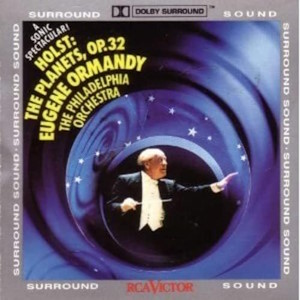
Gustav Holst (1874-1934)
The Planets, Op. 32
Women’s Voices of the Mendelssohn Club of Philadelphia (Neptune)
The Philadelphia Orchestra/Eugene Ormandy
rec. December 1975, Scottish Rite Cathedral, Philadelphia. ADD
Presto CD
RCA Victor 09026-61070-2 [51]
A recent, disappointing outing from Daniel Harding on BR Klassik (review) confirmed my attachment to recordings by Boult and Mehta but my interest was piqued by this Presto re-issue as I increasingly esteem Ormandy’s recordings as the years go by. This was his only recording of it and I do not know how often he performed it live – there is an excellent concert performance on YouTube – but it comes across as entirely idiomatic – if more like Zubin Mehta’s celebrated 1971 recording with the LA Philharmonic.
The first thing to note is that his timings are encouragingly conventional; Harding’s are decidedly laboured. Of course the analogue “Surround Sound” is not as deep and vivid as state-of-the art digital and the cathedral venue acoustic is quite resonant – but not over much and I don’t think anyone will have any complaints.
Technically and aesthetically, Ormandy had a great orchestra at his disposal – arguably America’s best – and this is the perfect showpiece for it. He begins “Mars” surprisingly quietly but at the right tempo and increases the dynamic gradually to a satisfying level. The stereo spread and separation are very good, without being overdone, the snare drum set well to the left and especially present, and the bank of brass blaring on the right. “Venus” enjoys some rounded, mellow horn and woodwind playing – especially the flutes. They are set well forward with the strings making a more ethereal, background canopy of sound – lovely. As every solo instrument – horn, violin, clarinet, oboe and cello in turn – contributes a line or a riff, the listener may admire their virtuosity. “Mercury” builds neatly with quicksilver lightness, subsiding humorously into burbling and chattering, ending almost diffidently and making a telling contrast with the heft of the opening of “Jupiter”. This is music which must be both weighty and literally jovial, and Ormandy gets the mood and pace right; it is grand, propulsive and rumbustious.
One of the joys of Holst’s masterwork is that contrast of mood as movement succeeds movement and after the riotousness of “Jupiter”, the chaste, chilly beauty of “Saturn” comes as a wrench; Ormandy succeeds completely in capturing the mystery of its grim march and the centrally placed tolling of bells is suitably chaotic before the music subsides into resignation and death. “Uranus, the Magician” gets the Big Band treatment but is not short on delicacy in articulation or dynamic nuance. “Neptune” recaptures the enigmatic mood of “Saturn”, although I could wish that the women’s voices crept in a little more quietly and subtly, and they remain rather more prominent than is ideal; I would have liked a greater sense of remoteness. It is a small blot; their singing is otherwise impeccable and they fade out most atmospherically.
This is a recording I happily place alongside my favourites. (I believe it is the one used for the film “Ken Russell’s View of The Planets”, first shown on ITV in 1983.)
Ralph Moore
Help us financially by purchasing from



















